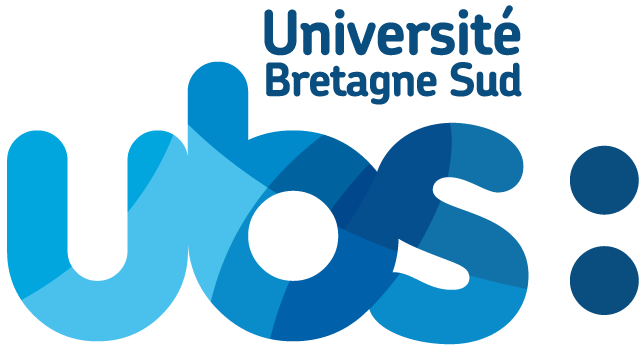Le séminaire de mathématiques de Vannes du LMBA Vannes a lieu, en général, le vendredi à 11h30 dans la salle F196 du bâtiment Yves Coppens de l'Université Bretagne Sud, situé sur le campus de Tohannic à Vannes.
Vous pourrez trouver sur cette page le planning des exposés (à venir, futurs et passés) du séminaire, des soutenances de thèse des doctorants du LMBA présents sur le site de Vannes ainsi que des événements scientifiques organisés à Vannes par les membres du LMBA.
Contact : Fabien Priziac (fabien.priziac@univ-ubs.fr).
Avril 2025
- 2-4 avril : Conférence Aléatoire et fractales (https://fractaleavannes.sciencesconf.org/)
- 25 avril : Arafat Abbar (Université Bretagne Sud)
Titre : Algèbres hypercycliques et shifts à poids sur les arbres
Résumé
- 29 avril (14h-15h, F196) : Matthieu Marbac (ENSAI)
Titre : Model selection for Non-Parametric Multivariate Finite Mixture Models
Résumé : This talk addresses the problems of model estimation for finite mixture models within a non-parametric framework. In particular, we are interested in methods that provide consistent estimators of the model, as well as methods that allow for the validation of the estimated model on the data.
In the first part, we consider the specific case of bivariate data to introduce methods that rely on integral operators. We show that these methods can be used to select the number of components in a mixture model and the number of states in a hidden Markov model.
In the second part, the dimension of the random vector is left unrestricted, and we present an approach for selecting the number of components and the subset of discriminative variables. This approach involves a discretization of each variable into a number of bins that grows with the sample size and a penalization of the resulting log-likelihood.
In the final part, we present a goodness-of-fit procedure that validates the model-based clustering outputs.
This talk is based on joint works with Marie Du Roy, Salima El Kolei and Marie-Pierre Etienne.
Mai 2025
- 15-16 mai : Séminaire Quimpériodique (https://www.lebesgue.fr/fr/QMPmai2025)
- 23 mai : Etienne Sirot (Université Bretagne Sud)
Titre : Coévolution des rythmes d'activité chez un prédateur et sa proie
Juin 2025
- 13 juin : Valentin De Bortoli (Google DeepMind)
Titre : Distributional Diffusion Models with Scoring Rules
Résumé : Diffusion models generate high-quality synthetic data. They operate by defining a continuous-time forward process which gradually adds Gaussian noise to data until fully corrupted. The corresponding reverse process progressively "denoises" a Gaussian sample into a sample from the data distribution. However, generating high-quality outputs requires many discretization steps to obtain a faithful approximation of the reverse process. This is expensive and has motivated the development of many acceleration methods. We propose to accomplish sample generation by learning the posterior |LF|\em distribution|RF| of clean data samples given their noisy versions, instead of only the mean of this distribution. This allows us to sample from the probability transitions of the reverse process on a coarse time scale, significantly accelerating inference with minimal degradation of the quality of the output. This is accomplished by replacing the standard regression loss used to estimate conditional means with a scoring rule. We validate our method on image and robot trajectory generation, where we consistently outperform standard diffusion models at few discretization steps.
Arxiv link: https://arxiv.org/abs/2502.02483
Septembre 2024
- 12 septembre : Journée de rentrée à l'île d'Arz (programme)
Octobre 2024
- 10-11 octobre : 30ème Séminaire Quimpériodique (https://www.lebesgue.fr/fr/QMPoct24https://www.lebesgue.fr/fr/QMPoct24)
- 10-11 octobre : Journées de l'ANR Mistic (https://mistic.math.cnrs.fr/?p=189https://mistic.math.cnrs.fr/?p=189https://mistic.math.cnrs.fr/?p=189https://mistic.math.cnrs.fr/?p=189)
Novembre 2024
- 8 novembre (14h en amphi A104 du bâtiment Simone Veil) : Soutenance de thèse d'Arthur Fétiveau
- 15 novembre : Jonathan Vacher (Université Paris Cité)
Titre : Perceptual Scales Predicted by Fisher Information Metrics.
Résumé : Perception is often viewed as a process that transforms physical variables, external to an observer, into internal psychological variables. Such a process can be modeled by a function coined perceptual scale. The perceptual scale can be deduced from psychophysical measurements that consist in comparing the relative differences between stimuli (i.e. difference scaling experiments). However, this approach is often overlooked by the modeling and experimentation communities. Here, we demonstrate the value of measuring the perceptual scale of classical (spatial frequency, orientation) and less classical physical variables (interpolation between textures) by embedding it in recent probabilistic modeling of perception. First, we show that the assumption that an observer has an internal representation of univariate parameters such as spatial frequency or orientation while stimuli are high-dimensional does not lead to contradictory predictions when following the theoretical framework. Second, we show that the measured perceptual scale corresponds to the transduction function hypothesized in this framework. In particular, we demonstrate that it is related to the Fisher information of the generative model that underlies perception and we test the predictions given by the generative model of different stimuli in a set a of difference scaling experiments. Our main conclusion is that the perceptual scale is mostly driven by the stimulus power spectrum. Finally, we propose that this measure of perceptual scale is a way to push further the notion of perceptual distances by estimating the perceptual geometry of images i.e. the path between images instead of simply the distance between those.
- 22 novembre (Exposé reporté à une date ultérieure) : Goulwen Fichou (Université de Rennes)
Titre : Fonctions rationnelles continues et semi-normalisation.
Résumé : Le but de l'exposé est d'expliquer la notion de fonctions rationnelles continues, et d'esquisser le lien avec la seminormalisation des variétés algébriques réelles.
- 26-27 novembre : 9èmes Rencontres de Statistique (https://www.lebesgue.fr/fr/rencontresstat24)
- 29 novembre : Mathieu Rosenbaum (École Polytechnique)
Titre : Des tremblements de terre à la compréhension des risques financiers.
Résumé : Cet exposé a pour but de présenter un panorama des résultats récents liés à la modélisation des risques financiers par les modèles type '"rough volatility''. Nous décrirons l'approche statistique ayant permis de mettre en place ces modèles puis détaillerons les aspects probabilistes associés, ainsi que les atouts pratiques expliquant la popularité de ce nouveau paradigme. Enfin, nous démontrerons que les modèles "rough volatility'' représentent les seules dynamiques permettant la viabilité d'un marché financier.
Décembre 2024
- 6 décembre : Christian Blanchet (Université de Paris)
Titre : Le théorème de Borsuk-Ulam pour les variétés de petite dimension.
Résumé : « A chaque instant il existe deux points antipodaux de la surface du globe où température et vitesse du vent coincident ». Ce résultat est conséquence du théorème de Borsuk-Ulam. Nous commencerons par une présentation élémentaire de ce théorème et de ses principales applications, puis nous généraliserons aux variétés, avec des résultats nouveaux en dimension 3 et 4 obtenus en collaboration avec Chahrazade Matmat.
- 12 décembre (10h-11h, F196) : Thibaut Lemoine (Collège de France)
Titre : Améliorer l'intégration numérique en utilisant les processus ponctuels déterminantaux.
Résumé : Les méthodes de Monte Carlo sont des algorithmes stochastiques visant à approcher l'intégrale I(f) d'une fonction f par la moyenne empirique de la fonction évaluée sur un échantillon aléatoire. Dans le cas le plus simple où l'échantillon est i.i.d., le théorème central limite nous dit que la moyenne empirique converge en loi vers une gaussienne de moyenne I(f) et de variance O(1/N). Bardenet et Hardy (2020) ont démontré que pour des intégrales sur |LS|-1,1|RS|^d, si on remplaçait un échantillon i.i.d. par un processus ponctuel déterminantal, on pouvait obtenir un TCL avec une variance O(1/(N^|LF|1+1/d|RF|)). Dans cet exposé, je vais montrer comment généraliser cette procédure à des variétés complexes, en utilisant un noyau reproduisant appelé "noyau de Bergman". Nous verrons que les méthodes de Bardenet-Hardy s'adaptent naturellement, et que le cadre de géométrie complexe produit un phénomène d'universalité qui rappelle celui des matrices aléatoires. Travail en collaboration avec Rémi Bardenet (CRIStAL).
- 13 décembre : Nicolas Dutertre (Université d'Angers)
Titre : Quelques propriétés topologiques des ensembles algébriques réels.
Résumé : Après avoir rappelé les définitions et propriétés des ensembles algébriques et semi-algébriques réels, on donnera une version du théorème du voisinage tubulaire pour les ensembles algébriques réels.
- 13 décembre (14h en salle D077 du bâtiment Yves Coppens) : Soutenance de thèse de Thi Trang Nguyen
- 19 décembre (14h en amphi A103 du bâtiment Simone Veil) : Soutenance de thèse de Samir Orujov
Janvier 2025
- 10 janvier : Salim Lardjane (Université Bretagne Sud)
Titre : Des nombres de Dedekind et de Cantor aux nombres de Conway
Résumé : L'exposé présentera les principales idées de la construction des nombres réels par Dedekind et des nombres transfinis par Cantor et Von Neumann et la généralisation de ces idées par Conway.
(Références :
1-Bourbaki, Ensembles, Chapitres 1 à 4, nv. tirage 1990
2-Bourbaki, Topologie Générale, Chapitres 1 à 4, 1971
3-Conway, On Numbers and Games, 1976
4-Dauben, Georg Cantor : His Mathematics and Philosophy of the Infinite, 1979
5-Dieudonné, Eléments d'Analyse 1, 1969
6-Halmos, Introduction à la théorie des ensembles, 1967
7-Knuth, Surreal Numbers, 1974
8-Landau, Foundations of Analysis, 1929 trad. 1966
9- Von Neumann, On the construction of transfinite numbers, 1923 trad. 1967)
- 13 janvier (9h45 : Exposé reporté à une date ultérieure) : Angelo Alcaraz (Université Bretagne Sud)
Titre : Une mesure de la vulnérabilité basée sur la diversité comportementale
Résumé : La diversité comportementale, qui permet de caractériser un ensemble de comportements accessibles pour une espèce donnée, est une donnée importante à prendre en compte dans le cadre de l'adaptation des espèces aux changements environnementaux. Celle ci reste cependant sous estimée dans les études de vulnérabilité des espèces aux changements climatiques, notamment à cause d'une difficulté de mesure. En s'inspirant de l'exemple de la diversité du régime alimentaire de poissons dans des récifs coraliens, je propose une mesure de la diversité comportementale basée sur une estimation d'enveloppe convexe. Cette présentation se construit comme une introduction à certains concepts d'écologie comportementale et de caractérisation de la vulnérabilité des espèces aux changements environnementaux et de leur conséquences sur une réflexion statistique.
- 13 janvier (11h30-12h30, visio/F196) : Leila Hamdad et Hamid Haddadou (Ecole nationale Supérieure d’Informatique, Algérie)
Titre : Machine learning based on kernel density estimation for spatially dependent data
- 17 janvier (10h) : Salim Lardjane (Université Bretagne Sud)
Seconde partie de la présentation intitulée Des nombres de Dedekind et de Cantor aux nombres de Conway
17 janvier (11h30) : Xiaoqun Zhang (Shanghai Jiao Tong University, Chine)
Titre : Accelerated Diffusion Posterior Sampling Models for Linear and Nonlinear Inverse Problems
Résumé : Diffusion models have emerged as powerful generative tools for solving inverse problems, particularly due to their ability to produce high-quality reconstructions from noisy and incomplete data. In medical imaging, inverse problems like CT reconstruction and travel-time tomography benefit from diffusion models' capability to conditionally sample based on observed data, promising advancements in both image quality and computational efficiency. This talk introduces accelerated diffusion posterior sampling methods tailored to improve both speed and accuracy in these settings, with specific focus on reducing radiation risks in CT and handling nonlinear complexities in PDE-based tomography. For CT, we propose a fast-sampling method that incorporates data consistency through an optimization step, initialized with a pretrained diffusion model conditioned on measurement data. This approach includes an iterative adaptation to noisy timesteps and a strategy to start sampling from the filtered back-projection (FBP) image midway, significantly reducing computational steps. For nonlinear PDE-based problems like travel-time tomography, we implement a plug-and-play posterior sampling process using the adjoint-state equation, along with a subspace-based dimension reduction to refine across grids efficiently. Experimental results show significant improvements, with a 20x speedup in CT reconstructions compared to original diffusion posterior sampling method and enhanced imaging quality in travel-time tomography, demonstrating the practical utility of diffusion models in clinical and other high-stakes applications.
- 24 janvier : Edouard Daviaud (Université de Liège)
Titre : Dynamical approximation by orbits of ergodic systems
Résumé
- 31 janvier (Exposé reporté à une date ultérieure) : Valérie Garès (INSA Rennes)
Titre : Record linkage and analysis of linked data with application in French national health data system
Résumé : The French National Health Data System is the national health data system which collects all the longitudinal health records and insurance information of most of the French population. These data can be used to enrich other existing databases (cohorts, health registries...), which allows to get a more comprehensive medical information on each patient, and thus, to improve the subsequent statistical analysis. However, patients in the SNDS and health databases are usually anonymised, and no unique patient identifier is available to match the databases. Fellegi and Sunter (1969) proposed a probabilistic record linkage method, based on the fact that we usually access some "matching variables" which serve as partial identifiers common to both databases (e.g., gender, postal codes, dates of the treatment…). They allow to calculate "matching probabilities" for each pair of patients taken in the SNDS and the health registry of interest. The Fellegi and Sunter model is limited to simple binary comparison between matching variables. In our first work, we proposed an extension of this model for mixed-type comparison vectors. We developed a mixture model for handling comparison values of low prevalence categorical matching variables, and a mixture of hurdle gamma distribution for handling comparison values of continuous matching variables. In a second work, we proposed models for survival analysis with matched data. Indeed, perfect matching is never achieved, and neglecting associated errors can lead to biased estimates. In this work, we proposed an adjusted estimating equation for secondary Cox regression analysis, where linked data have been prepared by someone else and no information on matching variables are available to the analyst. Finally, we may access the matching probabilities which convey some uncertainty on the matching process, and this uncertainty must be taken into account in any subsequent statistical analysis. We proposed a new method in order to take account of these errors in a survival analysis based on the Cox model. This method is based on the well-known EM algorithm for estimation in a missing-data context. The proposed models are applied to perform a survival analysis of linked data between a registry of patients suffering from venous thromboembolism in the Brest and the SNDS.
Joint work with Vanessa Chezeu, Huan Vo Tanh, Guillaume Chauvet and Jean-François Dupuy
Vo T.H., Gares V., L-C. Zhang L-C., Happe A., Oger E., S. Paquelet S. et Chauvet G. Cox regression with linked data. Statistics in medecine. 43(2), pp. 296-314, 2023. doi
Vo T.H., Chauvet G., Happe A., Oger E., Paquelet S. et Gares V. Extending the Fellegi-Sunter record linkage model for mixed-type data with application to the French national health data system. Computational Statistics and Data Analysis journal. 79, pp. 107656, 2023. doi
Février 2025
- 7 février (Exposé reporté à une date ultérieure) : Arafat Abbar (Université Bretagne Sud)
- 28 février : Angelo Alcaraz (Université Bretagne Sud)
Titre : Une mesure de la vulnérabilité basée sur la diversité comportementale
Résumé : La diversité comportementale, qui permet de caractériser un ensemble de comportements accessibles pour une espèce donnée, est une donnée importante à prendre en compte dans le cadre de l'adaptation des espèces aux changements environnementaux. Celle ci reste cependant sous estimée dans les études de vulnérabilité des espèces aux changements climatiques, notamment à cause d'une difficulté de mesure. En s'inspirant de l'exemple de la diversité du régime alimentaire de poissons dans des récifs coraliens, je propose une mesure de la diversité comportementale basée sur une estimation d'enveloppe convexe. Cette présentation se construit comme une introduction à certains concepts d'écologie comportementale et de caractérisation de la vulnérabilité des espèces aux changements environnementaux et de leur conséquences sur une réflexion statistique.
Mars 2025
- 14 mars : Journée du Comité Égalités du LMBA, à l'UBO
- 21 mars (10h15-11h15) : Emmanuel Frénod (Université Bretagne Sud)
Titre : Two-Scale Pic Methods as an Alternative to Gyro-Kinetic Simulations of Magnetic Fusion




